Workshop on "Transformational Materials IV"
Workshop
- Datum: 12.10.2022
- Uhrzeit: 09:20
- Vortragende: Prof. Yuriy Mokrousov, Prof. Guido Burkard, Prof. Miguel Marques, Prof. Felix von Oppen, Prof. Karin Everschor-Sitte
- Ort: Max-Planck-Institut für Mikrostrukturphysik, Weinberg 2, 06120 Halle (Saale)
- Raum: Lecture Hall Building B and Online / Please click here to register in advance
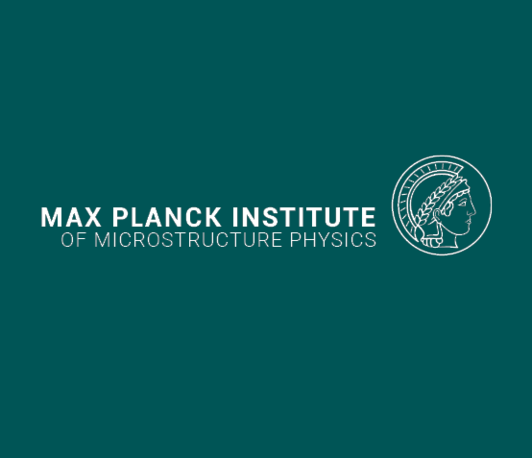
Addressing the future needs of computing and energy will require radical advances in materials. This workshop will explore the latest theoretical advances in understanding and predicting novel phenomena, such as effects that exhibit extraordinary quantum, electronic, magnetic, optical, topological, or emergent properties, that can lead to transformational materials for computing and energy.
PROGRAM
09:20 am - Introduction
09:30 am - Orbitronics: Prospects and Challenges - Yuriy Mokrousov (online)
10:30 am - Recent advances and challenges for semiconductor spin qubits - Guido Burkard (online)
11:30 am - Lunch Break
01:00 pm - Machine-learning assisted discovery and characterization of materials - Miguel Marques (on-site)
02:00 pm - Superconductors as transformational materials - Felix von Oppen (on-site)
03:00 pm - Computing with magnetic whirls - Karin Everschor-Sitte (online)
Orbitronics: Prospects and Challenges
Abstract
The challenges of modern spintronics motivate the constant quest for alternative, more efficient means of magnetization control and manipulation. In this talk I will discuss the prospects and challenges of so-called orbitronics – a field in magnetism which is concerned with generation, detection and manipulation of orbital angular momentum in solids. In particular I will show that non-equilibrium fluctuating matter can host prominent orbital magnetism and currents of orbital angular momentum, which can be used to transmit angular momentum over large distances in solids and can be utilized to control magnetization even in light materials with weak spin-orbit interaction. I will thus push forward a paradigm that unleashing non-equilibrium orbital physics and entanglement of spin and orbital degrees of freedom in diverse classes of materials can lead to much richer physics than expected previously, and might provide a key to realization of novel properties of quantum materials as well as energy-efficient applications.
Yuriy Mokrousov
Johannes-Gutenberg-University Mainz, Institute of Physics
Forschungszentrum Juelich, Institute for Advanced Simulation (IAS-1)
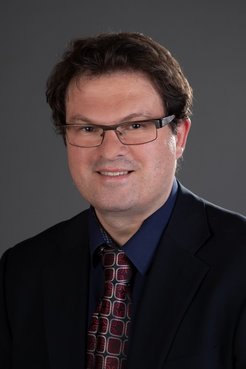
Yuriy Mokrousov is a professor of theoretical physics at the Johannes Gutenberg University of Mainz, and the head of the Topological Nanoelectronics group at the Peter Grünberg Institut of Forschungszentrum Jülich. His research interests lie in the field of electronic structure methods applied to studies of topological phenomena, transport effects and non-equilibrium physics of complex materials. He obtained his PhD in 2006 at the RWTH Aachen Univeristy, performing his postdoctoral research at the University of Hamburg and University of California at Berkeley, establishing his research group at Jülich Research Center in 2009 and at the University of Mainz since 2018.
Recent advances and challenges for semiconductor spin qubits
Abstract
Recent progress has shown that spin-based quantum bits in semiconductor systems allow for high-fidelity quantum gates and long-range interconnects via on-chip superconducting resonators. This talk will highlight recent advances related to spin-based quantum information processing from a theoretical perspective, including the impact of new material systems and nanostructures and of electric spin control. We discuss the importance of spin-charge hybridization for spin qubit control and measurement, and present several examples. Recently, electric spin control using synthetic spin-orbit coupling due to magnetic field gradients in combination with the exchange coupling has allowed for electrically controlled one- and two-qubit gates for spins in silicon quantum dots. The valley degeneracy in silicon and other semiconductors offers both challenges and opportunities which will be discussed. Alternative approached that are currently investigated include hole spins in germanium as well as the use of various multi-spin qubits containing more than one electron, such as the singlet-triplet, exchange-only, resonant-exchange, and quadrupolar qubits.
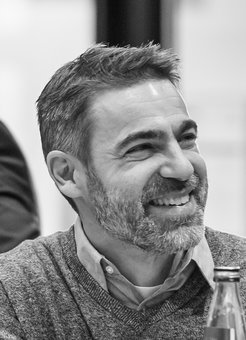
Guido Burkard
Department of Physics, University of Konstanz
Machine-learning assisted discovery and characterization of materials
Abstract
The development of density-functional theory in the 1960s and the dissemination of computers led to a revolution in materials science. A third kind of physics, computational physics, emerged to complement its theoretical and experimental sisters. Nowadays, with the availability of ever faster supercomputers and novel computer methodologies, we are living what one can call the second computer revolution in materials science. High throughput techniques, together with ever faster supercomputers, allow for the automatic screening of thousands or even millions of hypothetical materials to find solutions to present technological challenges. Moreover, machine learning methods are used to accelerate materials discovery by complementing density-functional theory with extremely efficient statistical models.
In this talk we summarize our recent attempts to discover, characterize, and understand inorganic compounds using these novel approaches. We start by motivating why the search for new materials is nowadays one of the most pressing technological problems. Then we summarize our recent work in using crystal-graph attention neural networks for the prediction of materials properties. To train these networks, we curated a dataset of over 2 million density-functional calculations with consistent calculation parameters. Combining the data and the newly developed networks we have already scanned more than two thousand prototypes spanning a space of more than one billion materials and identified tens of thousands of theoretically stable compounds. We then discuss how simple, interpretable machine learning approaches can be used to understand complex material properties, such as the transition temperature of superconductors. Finally, we speculate which role machine learning will have in the future of materials science.
[1] Recent advances and applications of machine learning in solid-state materials science, J. Schmidt, M.R.G. Marques, S. Botti, and M.A.L. Marques, NPJ Comput. Mater. 5, 83 (2019)
[2] Crystal-graph attention networks for the prediction of stable materials, J. Schmidt, L. Pettersson, C. Verdozzi, S. Botti, and M.A.L. Marques, Sci. Adv. 7, eabi7948 (2021)
Miguel Marques
Martin Luther University Halle-Wittenberg, Institute of Physics
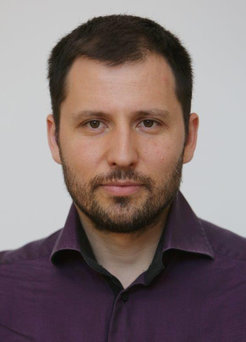
Miguel Marques received his PhD degree in Physics from the University of Wuerzburg in 2000, working under the supervision of E.K.U. Gross in the field of density functional theory for superconductors. He then held several post-doctoral positions in Spain, Germany, and in France. From 2005 to 2007 he was assistant professor at the University of Coimbra in Portugal. From 2007 to 2014 he was CNRS researcher at the University of Lyon 1. Since then he is professor at the Martin-Luther University of Halle-Wittenberg. His current research interests include density functional theory, superconductivity, application of machine learning to materials science, etc. He authored 200 articles with more than 17500 citations and a Hirsch index of 60 (source: Google Scholar), and has edited three books published by Springer in the Lecture Notes in Physics series. He also organized several summer schools and international workshops, such as the Benasque School and International Workshop in TDDFT, that takes place in Benasque, Spain every second year.
Superconductors as transformational materials
Abstract
Superconductors have emerged as a premier materials class for implementing quantum technologies. Along with potential applications, this has raised a multitude of fascinating research questions of fundamental nature. In this talk, I will focus on our work regarding two such questions, the search for topological superconductivity and the quest for superconducting diodes.
Felix von Oppen
Freie Universität Berlin, Department of Physics, Dahlem Center for Complex Quantum Systems
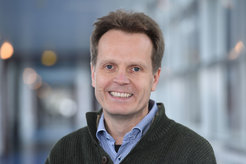
Felix von Oppen is a theoretical condensed matter physicist and professor at Freie Universität Berlin. His research interests are in topological states of matter and their application to topological quantum computation as well as in strongly correlated and nanoscale electron systems. Felix von Oppen obtained his PhD from the University of Washington, held postdoctoral and temporary researcher positions at the Max-Planck-Institute for Nuclear Physics in Heidelberg, the Weizmann Institute of Science in Israel, and the University of Cologne before joining Freie Universität Berlin in the year 2000.
Computing with magnetic whirls
Abstract
Novel computational paradigms in combination with proper hardware solutions are required to overcome the limitations of our state-of-the-art computer technology. In this talk, I focus on the potential of magnetic whirls – so-called skyrmions – for computing.
Skyrmions are topologically stable whirls that occur in various areas of physics and were discovered in particle physics by Tony Skyrme in the 1960's. Skyrmions, which occur in magnetic systems, were first observed experimentally in 2009. Within a decade, the field of magnetic skyrmions has developed into a very active area of research, with the aim of exploiting the topological properties of the magnetic whirl-like particles for spintronics applications. For example, the peculiar twist of the magnetization in skyrmions leads to a very efficient coupling to electric currents and allows for “banana kicks” analogous to those in soccer. More recently, magnetic skyrmions have become into the focus of unconventional computing schemes such as reservoir computing.
Karin Everschor-Sitte
Faculty of Physics and Center for Nanointegration Duisburg- Essen (CENIDE), University of Duisburg-Essen, Duisburg, Germany
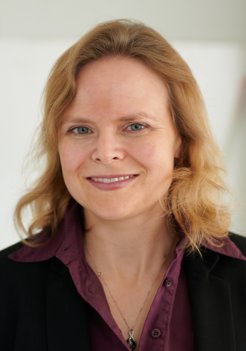
Karin Everschor-Sitte is a professor of Theoretical Physics at the University of Duisburg-Essen. Her main scientific field is the complex fundamental physics of topological magnetic textures with emphasis on magnetic skyrmions. Within the last years she has expanded her research direction towards spintronics-based unconventional computing. After completing her PhD at the University of Cologne in 2012, Karin Everschor-Sitte was a postdoc at the Technical University Munich and then obtained a postdoctoral fellowship with the DAAD to perform research at the University of Texas at Austin. Followed by a period as a postdoc, she led an Emmy Noether group at the Johannes Gutenberg University Mainz, from 2016 -2021. In 2018 she was awarded the Hertha-Sponer-Prize.




